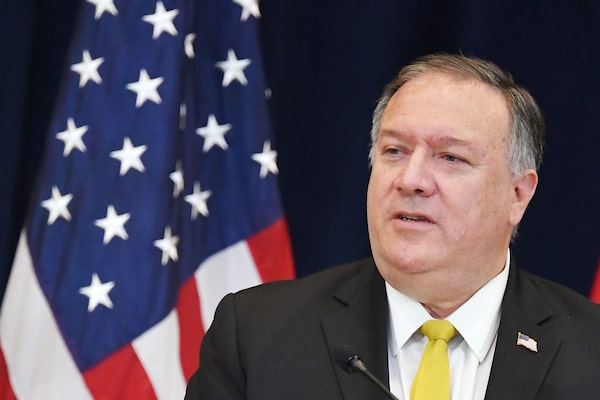
U.S. Secretary of State Michael Pompeo speaks during a news conference at the State Department, in Washington, on Aug. 19, 2020.MANDEL NGAN/AFP/Getty Images
After a resounding defeat in the UN Security Council, the United States is poised to call for the United Nations to reimpose sanctions on Iran under a rarely used diplomatic manoeuvre – a move that is likely to further isolate the Trump administration and may set off a credibility crisis for the United Nations.
The sanctions had been eased under the 2015 nuclear deal that U.S. President Donald Trump withdrew from two years ago. But last week the U.S. lost its long-shot bid to indefinitely extend an international arms embargo on Iran and has now moved to a new diplomatic line of attack.
Secretary of State Mike Pompeo said Wednesday the move would come “soon,” but he would not discuss timing. He was expected to travel to New York on Thursday to notify the Security Council president that the U.S. was invoking the “snapback” mechanism in the council’s resolution that endorsed the nuclear deal.
Mr. Pompeo will also meet with UN Secretary-General Antonio Guterres at his residence, UN spokesman Stéphane Dujarric said Wednesday.
“I don’t have any announcements on timing about what we’re going to do, but the president’s made clear we’re going to do it soon and we will,” Mr. Pompeo told reporters, brushing aside concerns that other countries may not recognize the American move.
“This will be a fully valid enforceable Security Council resolution and we have every expectation that it will be enforced just like every other Security Council resolution that is in place,” he said. “We will be in full compliance with that and we have every expectation that every country in the world will live up to its obligations.”
Snapback allows participants to demand the restoration of all UN sanctions in a complicated procedure that cannot be blocked by a veto.
Mr. Pompeo and Mr. Trump have made no secret of their intention to invoke snapback, especially since their attempt to extend the arms embargo suffered an embarrassing defeat last Friday. The U.S. won just one other “yes” vote, with China and Russia opposed and the 11 other members abstaining.
“Iran’s support for its proxies in Syria only helps to bolster the Assad regime and undermine the UN process,” said U.S. Ambassador Kelly Craft in remarks at Wednesday’s council meeting on Syria. “How will giving Iran access to more weapons serve the interests of international peace and security?”
Just like the arms embargo extension, the administration’s snapback plan is bitterly opposed by China and Russia as well as the other Security Council members, including U.S. allies Britain and France, and could set the stage for a battle over the legitimacy of the UN‘s most powerful body.
Alone among the council’s 15 members, the U.S. argues that as an original participant in the nuclear deal it retains the right to demand restoration of sanctions. The others, which still support the deal, maintain the U.S. lost that standing when Mr. Trump pulled out of the accord in 2018, but it isn’t clear if they can stop the invocation of snapback through technical procedural means.
The U.S. argument is highly controversial. It has been ridiculed by the Chinese, Russians and Europeans, and not even the biggest Iran hawks in the U.S. all agree with it.
Former Trump national security adviser John Bolton, no slouch when it comes to anti-Iran positions, has long said that the U.S. lost its snapback standing when it withdrew from the deal and that moving ahead is not worth the damage it could do to U.S. veto power in the council.
In a stunningly rare moment of agreement, Iran’s Foreign Minister Mohammed Javad Zarif praised Mr. Bolton this week. “At least he is consistent – a trait notably absent in this U.S. administration,” Mr. Zarif tweeted.
And, former U.S. Undersecretary of State for Political Affairs Wendy Sherman, a top Obama administration negotiator of the nuclear agreement, said: “It was never expected that someone who withdrew from the [deal] would have standing to in fact bring the snapback provision.”
Thus, the administration’s insistence on moving ahead has set the stage for a contentious dispute and the possibility that the U.S. call would simply be ignored by other UN members. That outcome would potentially call into question the Security Council’s ability to enforce its own legally binding decisions.
Under the terms of Security Council Resolution 2231, which enshrined the nuclear deal and to which the U.S. remains a party, the invocation of snapback for significant Iranian non-compliance starts a 30-day clock during which the council must vote affirmatively to continue the sanctions relief that Iran was given in return for curbs on its nuclear program.
Mr. Pompeo is expected to present evidence of significant non-compliance, likely the latest reports of the UN nuclear watchdog, the International Atomic Energy Agency, on Thursday. Iran does not deny violating some terms of the deal but says its actions have been forced by the U.S. withdrawal and the Trump administration’s reimposition of U.S. sanctions.
As envisioned by the Obama administration, which led the negotiations that culminated in the nuclear deal, the U.S. or any other permanent member of the council could use its veto to block the continuation of sanctions relief. In theory, that would result in the reimposition of sanctions.
But whether any other council member will respond to the U.S. move by introducing a resolution to extend sanctions relief is an open question.
Our Morning Update and Evening Update newsletters are written by Globe editors, giving you a concise summary of the day’s most important headlines. Sign up today.